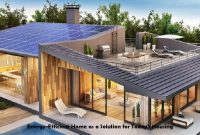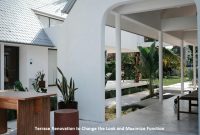Feng Shui roof is one aspect that we cannot ignore carelessly. According to Feng Shui beliefs, the roofs is directly related to the energy that flows in the house. In other words, this property element can have a big influence on family life.
Both in terms of health, happiness, luck, and overall well-being. Therefore, the choice of design and color must be right. Let’s review in more detail in the following explanation.
Understanding Feng Shui Roof to Create a Harmonious Environment
As we know, the roof is a crucial part of a building, especially a house design. Its main function is to protect residents from various external factors. Such as rain, sun heat, wind and other dangers. They will guarantee the comfort and safety of residents from various threats.
Meanwhile, according to Feng Shui, the roof has a vital role as the main protector that regulates the flow of energy. Feng Shui believes that the balance of energy or “Chi” must flow smoothly in order to build a harmonious environment.
That means, a roof with the best design can support a positive flow of Chi. Thus providing a sense of security and stability for residents. Conversely, an inappropriate roof design can cause bad energy flow.
This can trigger a number of negative impacts on health and fortune. Here are some Feng Shui principles of roofs in terms of design that we need to understand.
1. Flat Roof
The first type is a flat roof which is said to be able to represent the earth element as well as represent stability and progress. They are very suitable for us to combine with a square housing model. Especially in houses facing northeast or southwest.
However, some others argue that flat roofs are often less than ideal in Feng Shui. There is an assumption that the model does not provide sufficient protection for the occupants of the house. Given that the flat shape inhibits the flow of good Chi.
2. Triangular or Sloping Roof
Next is a triangular roof which according to this belief is the best. The sloping roof itself has fire energy and is suitable for rectangular or square houses. Especially in houses facing south.
However, it is important to pay attention to the position of the roof slope. The reason is, a triangular shape that is too steep or sharp actually causes disharmony and household conflict. Especially if the house faces north.
Even so, this shape can still be beneficial for residents whose luck is in the fire element. For example, culinary entrepreneurs who consider fire energy as good luck may prefer to live in a sloping roof house.
3. Dome or Round Roof
Feng Shui beliefs about roofs state that dome or circle shapes are not ideal for residences. This is because the circular design on the roof represents the metal element. Where heavy metal above the head can bring bad luck.
On the contrary, this dome roof model is more suitable for places where many people gather. Call it a mosque, meeting room or other specific place that does not function as a residence. In order to be more lucky, it is better to build a dome-roofed building facing west.
Favorable Roof Colors According to Feng Shui
In addition to shape, roof color also affects the flow of energy in Feng Shui. Each of these colors is closely related to certain elements that will affect the life sector in the residence. Here are the explanations for each.
1. Red
The first and most popular choice is red, where they symbolize the fire element. In the explanation on @bloomingfengshui, this color can provide spirit energy. So that it can attract good luck and prosperity. Prioritize choosing a red roof on a residence that faces south, not north.
2. Black
Other than red, black symbolizes the water element. It is related to flow and movement. A black roof can provide peace and balance in the lives of residents of houses facing north.
3. Brown Shades
Finally, a brown roof symbolizes the earth element. Something that is often related to stability and tranquility. Suitable for creating a calming atmosphere while supporting harmonious family relationships.
Overall, by applying the principles of feng shui roof, we can support a better life. Even so, this is part of a belief. Whether it is true or not still depends on the stability of each person’s heart.



